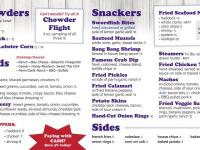You say po-tay-to, I say po-tah-to
Just who doesn’t love a potato? Always dependable and adaptable, this humble tuber provides more protein and energy than any other food crop per unit of land. From Ireland to Idaho, potatoes offer every society an excellent source of delicious calories and comforting carbohydrates.
Thanks go to Nathaniel Butler, Governor of Bermuda, who back in 1621 sent two large cedar chests full of potatoes (wonder if they tasted cedar-y?) to Governor Francis Wyatt of Virginia at Jamestown and the potato was introduced to the colonies. It is documented by food historians that the first permanent potato field in North America was established in 1719, probably near Derry, N.H., by Scots-Irish immigrants. From there, the crop spread across the country.
American food writer Linda Wells observes that the potato is to food “what sensible shoes are to fashion.” Dressed up with cream, caviar or cheese the potato becomes movie-star glamorous. Dress it down with just a pat of butter and a sprinkling of salt and pepper and it is still right there in the “divine” category.
With Maine’s rich soil, warm summer days and chilly nights, the climate of our state is ideal for growing potatoes and we are one of the top potato producing states in the U.S. The average American eats about 135 pounds of potatoes annually, which averages to about one potato per day.
Have you noticed all the different varieties of potatoes in the supermarket bins these days? If you've ever wondered just what type of potato to use for a specific recipe, here's the scoop:
- Chef’s potato: An all purpose white potato that is medium starchy.
- Fingerling: Small and oval in shape, with a pink, yellow, blue or tan skin and flesh. Best steamed or roasted.
- Long white: Oval in shape with a thin, pale skin; a good all-purpose potato.
- Round white: A medium-starchy potato just right for scalloped potatoes and also a good choice for roasted potatoes and potato salad.
- Round red: Waxy texture; perfect for potato salad and also good for boiling, steaming, or roasting.
- Russet: Dry, mealy texture which is ideal for baking.
- Yukon Gold: Round, with a pale skin and yellow flesh. Excellent for mashed potatoes and good for baking or frying.
Buy potatoes that are smooth, free of sprouts, cracks and other blemishes. Green areas on potatoes indicate solanine, which is a toxic alkaloid produced as a result of prolonged exposure to sunlight. The potato is okay to eat as long as you cut away the green area. Avoid potatoes in plastic bags which trap moisture and often cause potatoes to soften or sprout. Store potatoes in a cool, dry, dark area in a container that allows good air circulation. An inexpensive plastic bin with lots of air holes for ventilation works well. Do not store potatoes near onions. Onions give off a gas that will cause the potatoes to sprout. So-called “new” potatoes will only keep a few weeks, but most other varieties of potatoes will last for several months if stored properly.
Maine potato doughnuts
- 4 cups all purpose flour
- 4 Tbsp. buttermilk powder
- 2-1/2 tsp. baking powder
- 1/2 tsp. baking soda
- 1 tsp. salt
- 1 tsp. cinnamon, divided use
- 1/4 tsp. nutmeg
- 2 large eggs
- 2 cups sugar, divided use
- 1 cup water
- 2 Tbsp. melted butter
- 1 Tbsp. vanilla extract
- 1 cup well mashed potatoes (no lumps!)
- Vegetable oil for frying
Combine flour, buttermilk powder, baking powder, baking soda, salt, 1/2-tsp. cinnamon and nutmeg in a large bowl. Whisk to blend; set aside.
Combine eggs and 1 cup sugar in a large bowl (or bowl of stand mixer) and beat until combined and slightly foamy. Add 1 cup water, butter, vanilla and mashed potatoes and stir until smooth. Slowly add reserved flour mixture; stir until just incorporated. Divide dough in half and form into two balls. Wrap in plastic wrap and flatten into discs. Refrigerate for at least two hours or overnight.
Generously flour a large work surface. Take one disc and turn out to coat with flour, sprinkling the surface of the dough with flour to lessen stickiness, if needed. Gently pat the dough to about 1/2 an inch thick. Cut out using a floured 3-inch doughnut cutter. Place doughnuts and holes on a well floured sheet of parchment paper.
Fill a Dutch oven with 2 inches of oil; heat over medium high heat until 360°F. Drop doughnuts in oil (do not crowd) and cook two minutes per side or until a deep golden brown. Remove doughnuts from the pan and set on paper towel lined baking racks to cool. Cool slightly; toss in a bag with remaining 1/2 tsp. cinnamon mixed with remaining 1 cup sugar. Serve immediately.
Potato gratin with mushroom and gruyere
- 1/4 cup extra virgin olive oil
- 4 cups finely chopped leeks (white and pale green parts only; about three large)
- 1-1/2 lbs. assorted mushrooms wiped clean and cut into 1/2 inch pieces (you should have about ten cups)
- Salt and freshly ground black pepper
- 2 cloves garlic, peeled and minced
- 3 lbs. Yukon Gold potatoes, peeled and cut into 1/8-inch-thick slices
- 2 cups heavy cream
- 1 tsp. (or more) salt
- 1/2 tsp. (or more) freshly ground black pepper
- 1 cup coarsely grated Gruyère cheese
Heat olive oil in a large skillet set over medium-high heat. Add leeks; sauté 10-12 minutes or until soft and lightly browned. Add mushrooms; season with salt and pepper, and sauté seven to eight minutes or until soft and liquid evaporates. Add garlic; sauté one minute. Set aside. (Can be made to this point four hours ahead of time.) Let stand at room temperature.)
Pat potato slices dry. Combine cream, 1 tsp. salt, and 1/2 tsp. pepper in a large pot. Add potatoes. Bring to boil; reduce heat to medium and simmer, covered, 10 minutes, stirring occasionally. Remove lid; simmer until cream is reduced by about half and potatoes are partially cooked, about 3 minutes. (Stir often and watch closely to prevent mixture from scorching.)
Coat a 13x9x2-inch glass or ceramic baking dish with non-stick spray. Transfer half of potato mixture to dish, spreading out in even layer. Spoon mushroom mixture over in an even layer. Spoon remaining potato mixture over, spreading in an even layer and sprinkle with cheese. Cover with foil, tenting in center to prevent cheese from sticking to foil. Bake in a preheated 375°F oven for 30 minutes. Uncover; bake 20-25 minutes longer or until potatoes are tender and top is golden brown. Remove from oven and let stand 10 minutes before serving. Yield: 8 to 10 servings.
Asiago stuffed potatoes
- 16 small red skinned potatoes (about 2 inches in diameter)
- 1 tsp. salt
- 10 large basil leaves
- 1 small head garlic, roasted (*See directions below)
- 8 oz. Asiago cheese, finely grated (can substitute Parmesan)
- 1 cup good quality mayonnaise
- 1/4 tsp. freshly ground black pepper
- Paprika
- Place potatoes in a large pot; add salt and enough cold water to cover. Bring to a boil; cover and reduce heat to low and cook for 10-12 minutes or until tender. Drain; rinse with cold water. Refrigerate for 35-40 minutes or until cool.
Mince basil and place in a small bowl. Add garlic paste, cheese, mayonnaise and black pepper; mix well. Using a small melon-ball cutter or a grapefruit spoon, scoop out a hole in each cooled potato, leaving a 1/4-inch shell. Stuff potatoes with cheese mixture and place on a sheet pan. (TIP: if wobbly, place in a mini-muffin pan for stability.) Bake in a preheated 350°F oven on the middle rack for 18-20 minutes or until cheese is melted and bubbling. Yield: six to eight servings
Roasted garlic
Cut off a very thin slice from the top (pointy end) of a whole head of garlic. Place on a square of aluminum foil with cut side up; drizzle with 1 Tbsp. of olive oil. Seal foil tightly and bake in a preheated 400°F oven for 1 hour or until garlic is the consistency of toothpaste. Add to mashed potatoes, soups, pasta sauces, mayonnaise, etc. Roasting the garlic changes the flavor to a mild, nutty flavor. (TIP: I do several heads of garlic at a time as they can be frozen for up to 3 months.)
Paula Anderson is a freelance journalist specializing in food, entertaining and nutrition. She writes for several newspapers, as well as Maine Food & Lifestyle Magazine. She divides her time between Scarborough and Big Pine Key, Fla., where she lives with her husband Peter and their kitty Mina. Correspondence can be addressed to her at the Boothbay Register, P.O. Box 357, Boothbay Harbor, ME 04538 or the Wiscasset Newspaper, P.O. Box 429, Wiscasset, ME 04578. You can also write to her directly via email at pander@maine.rr.com.
Event Date
Address
United States























